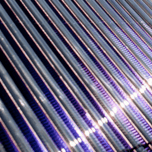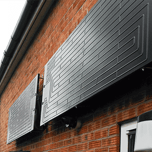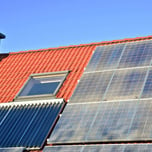Answer these simple questions and we will find you the BEST prices
Which type of solar quotes do you need?
It only takes 30 seconds
100% free with no obligation

Get up to 4 quotes by filling in only 1 quick form

Slash your energy bills by installing solar panels

For the average 2-3 bedroom house
- GreenMatch
- Solar Energy
- Solar Thermal
Water Heating with Solar Thermals UK (October 2025 Guide)

What Is a Solar Thermal Panel?
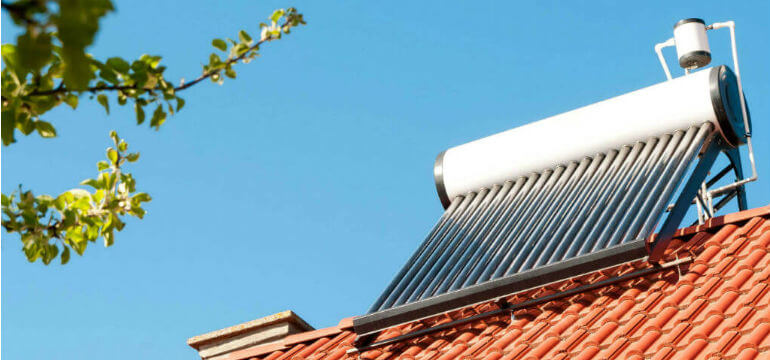
A solar thermal system uses the energy from the sun to heat up water to use in the home. The way a solar thermal panel works is quite simple: it absorbs the heat from the sun with panels that are called solar collectors.
The heated water or heat-transfer fluid then runs from the collectors to your hot water cylinder. This way a solar water heating system can provide your home with free heated water.
Solar thermal panels are not to be confused with solar panels, which use the energy from the sun to generate electricity. As such, solar panels and solar thermals are two very different technologies.
While there are many advantages and disadvantages of solar energy, using solar energy has more pros than cons. Among the biggest pros are the the money saved on energy bills, the reduction of your carbon footprint and the low maintenance, making solar thermal a great investment.
If you are interested in solar thermal panels and want to find the best solar panels for your home, simply fill in our 30-second form. This way, we will save you time by getting you up to 4 quotes free, non-binding quotes from reputable local installers. Just click below to get started now!
- Quotes from local engineers
- Payment by finance available
- Save up to £1,567 per year
It only takes 30 seconds



Are Solar Thermal Panels Suitable for Your Home?
Purchasing a solar thermal system is a significant investment at first. Therefore, before purchasing one, it is important to ask yourself a couple of questions. The three most important things you have to keep in mind are:
- Do you have a spot that catches a lot of sun?
- Do you have enough space for a hot water cylinder?
- Do you have a boiler that is compatible with solar water heating?
Spot in the Sunlight
Solar thermal power generation needs the sun as the main energy source. Therefore, the optimal position to be situated is somewhere with direct sunlight for the most part of the day. This could be on a roof space which faces east to west through south. Different placement is still possible, however, the efficiency of heating water will be decreased.
However, they don’t necessarily need to be placed on a roof. Other possible places could be on a flat roof or hang from a wall, as long as it gets direct sunlight.
Enough Space
A solar thermal requires a dedicated solar cylinder. If you don’t own a solar cylinder, the existing cylinder is replaced or a dedicated cylinder with a solar heating coil is added.
Compatible Boiler
Fortunately, most conventional boilers are compatible with solar water heating systems. Your home is not compatible when you have a combination boiler without a hot water tank, however.
If you want to know more about whether solar thermal panels are the right fit for your home, your best bet is to consult a solar expert. They can offer you tailored advice and give you more information about how you can pair your solar system with other appliances such as a boiler, an air source heat pump, or a hot water cylinder to make the most of solar power.
Finding a reliable solar panel installer to bring your questions and concerns to can be overwhelming. With so many options to choose from, it can be hard to determine which professional you can trust to advise you.
To help you avoid the stressful and time-consuming research process, we can put you in touch with up to 4 local solar panel installers from our broad network of reputable specialists. Simply click below and fill in our 30-second form to request free, non-binding quotes and find the right installer for you!
- Quotes from local engineers
- Payment by finance available
- Save up to £1,567 per year
It only takes 30 seconds



How Much Does a Solar Thermal System Cost?
When you choose to purchase a solar thermal, the costs of installing will vary between £4,000-5,000 (including VAT of 5% for a 3.6m2 system). Even though this sounds like a significant investment, the system can provide a fair amount of hot water throughout the year.
Luckily, to cover the costs of switching to this renewable energy system, the government compensates you for using renewable energy from a solar water heating system. This is called the Domestic Renewable Heating Incentive (RHI) and is paid over 7 years based on the amount of heat produced by your heating system. Making solar thermal a cheap solar panel system type.
An average detached house in the UK would receive the following support from the Renewable Heating Incentive:
| Household Size (Detached House) | Per Quarter | Per Year | 7 Years |
|---|---|---|---|
| 2 person household (2 bedrooms) | £43 | £170 | £1,190 |
| 3 person household (2 bedrooms) | £45 | £180 | £1,260 |
| 4 person household (3 bedrooms) | £48 | £190 | £1,330 |
The tariff is 20.66 pence/kWh for every application sent in before 1st of January 2019.
Next to that, you will also save money on your bill by using solar energy. How much you will save in costs depends on what system you have currently installed in your home.
| Existing System | Gas | Oil | Coal | Electricity | LPG |
|---|---|---|---|---|---|
| Fuel Bill Savings per Year | £50 | £55 | £65 | £80 | £95 |
Switching to solar energy is not only good for the environment, it's also good for your wallet. With a solar thermal system, you can save hundreds of pounds on your annual energy bills each year.
At GreenMatch, we can help you find the best solar energy solution for your home at the best price. Our highly-qualified partner installers will provide you with up to 4 tailor-made quotes, giving you the opportunity to compare prices and find the perfect deal for your home. Just click the button below to get started with our 30-second contact form.
- Quotes from local engineers
- Payment by finance available
- Save up to £1,567 per year
It only takes 30 seconds



How Much Hot Water Can You Expect from Solar Thermal?
An average solar thermal system in the UK covers around 40%-60% of the total hot water consumption of a household throughout the year. This includes hot water for showers, hot taps, etc. The specific amount of hot water that is produced depends on the time of year.
- During the summer, the solar thermal panel can produce most or all of the hot water demand.
- In the spring and autumn, by pre-heating the water in your cylinder, your solar thermal can reduce the amount of energy needed to heat your water.
- Winter is a more problematic season for solar thermal panels because the sunlight is weaker and days are shorter. The solar thermal will make a smaller contribution to your water heating.
What Happens to the Heated Water When It’s Not Used Straightaway?
The solar thermal technology is designed in a way that the heated water is stored in a separate tank for preheating or a regular water tank until you need it. Even if additional heat is needed, the regular water heating system jumps in and provides the extra heat through electricity or fossil-fuel energy.
How Does a Solar Thermal Panel Work?
A solar powered heating system can provide your home with hot water throughout the year. But how does it actually work? This video shows the process of how it heats the water in your home.

What Type of Solar Thermal Would Fit the Best?
All solar thermal panels use solar collectors to absorb solar energy. There are 4 general types of solar water heating systems that differ in the way they use the solar collectors:
- Active: electric power is needed to activate pumps.
- Passive: relies on natural convection rather than electricity to circulate the hot water.
- Direct: the potable water is heated in the collector.
- Indirect: the transfer fluid is heated in the collector and transfers the heat to potable water.
Solar thermal systems can also be categorised based on the type of collectors:
1. Flat Plate Panels
A flat plate panel looks similar to a panel in a photovoltaic system. Its design includes an absorber panel attached to multiple copper pipes through which the water or transfer fluid passes. These copper pipes are encased in a metal frame that is surrounded by insulation to support the retainment of the collected heat. A sheet of glass or glazing protects this frame, which, at the same time, provides a space of air that works as insulation.
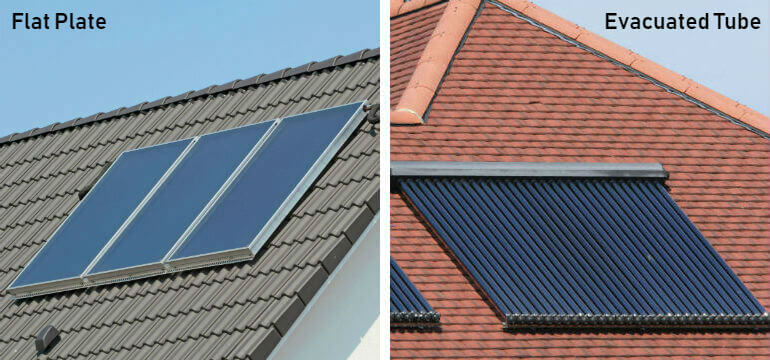
2. Evacuated Tube Collectors
In comparison to flat plate panels, evacuated tube collectors are more efficient, especially in cold climates. On the downside, they lose efficiency in warmer seasons due to the risk of overheating. This is due to the vacuum tubes that are designed to avoid heat loss and therefore differ to flat plate panels that tend to lose some heat.
Evacuated tube collector is usually made of a heat pipe surrounded by a glass tube. These are under a vacuum. Having something under vacuum is a better heat retention than air space. In addition, the heat pipe is pressurised, which allows the fluid to boil rapidly.
In general, you need about 1m2 of solar collector area per person.
- An average flat plate solar collector is sized between 2m2-4m2. This means you need between 1 or 2 of these collectors depending on the size of your households.
- When you use an evacuated tube collector, you might need between 20-30 tubes to meet your hot water demand.
If a solar water heater isn’t your perfect fit, there are alternatives like thermodynamic panels that might be a better fit for your home.
Flat Plate Evacuated Tube
Advantages and Disadvantages of Solar Thermal
Even though, the advantages of solar PV panels are clear, the benefits of solar thermal panels are worth mentioning too.
Renewable Energy Source
Renewable Energy Source
The most important benefit is that solar energy is a 100% renewable energy source. We will always have solar energy.
Reduce Bills
In the long run, it will save you a significant of money.
Reduce Carbon Footprint
An average UK household can reduce their CO2 emissions up to 400 kg per year.
Low Maintenance
Solar thermal panels require little maintenance and only occasional planned servicing. You only have to keep them relatively clean. The only part that needs to be replaced is the inverter that works continuously to generate heat, which usually lasts for 5-10 years.
Initial Investment
The cost of purchasing a solar thermal system is quite high, but it will be profitable in the long-run. You will also be eligible for the Renewable Heat Incentive (RHI) which supports you with yearly payments.
Weather Dependent
The summer is the best time to generate heated water. Nevertheless, a solar thermal can generate 40%-60% of your heated water throughout the year.
Necessary Space
It needs both enough space and enough sunlight for it to cover your heat demand. Some homes don’t have the amount of space required. A solution in this case is to place them in the yard, as long as they catch enough sunlight.
Limited Use
It can only heat water but not to heat rooms or generate electricity. Yet, an average person uses between 90-160 liters of hot water a day which can be covered with an appropriately sized solar thermal system.
Find the Best Solar Thermal Suppliers in the UK
A solar thermal system is quite an investment at first. That’s why you want to make sure that you get informed well enough to choose the right fit for your home. Comparing technical systems and analysing what type of system is the best for your home can be a bit overwhelming. If you would like to get advice or help in finding the right solar water heating system for your home, then you are in the right place.
We are here to help you in making the right decision. GreenMatch streamlines the entire process to be as quick and painless as possible. Simply fill in the contact form at the top of the page and get up to 4 quotes from our suppliers, free of charge and without any obligations.
- Quotes from local engineers
- Payment by finance available
- Save up to £1,567 per year
It only takes 30 seconds




Aris Vourvoulias was the Head of Content in GreenMatch. Aris is a passionate author and marketer with an educational background in journalism. He continuously writes, reviews, and educates himself in the areas of business, finance, and renewable energy. He has managerial experience in many European markets, including UK, Denmark, Sweden, and Finland. He and his content team have been featured on reputable sites like GreenPeace, Guardian, iNews, Gizmodo, and more

We strive to connect our customers with the right product and supplier. Would you like to be part of GreenMatch?

- What Is a Solar Thermal Panel?
- Are Solar Thermal Panels Suitable for Your Home?
- How Much Does a Solar Thermal Cost?
- How Much Hot Water Can You Expect from Your Solar Thermal?
- What Type of Solar Thermal Would Fit Best?
- Advantages and Disadvantages or Solar Thermal
- Find the Best Solar Thermal Suppliers in the UK

